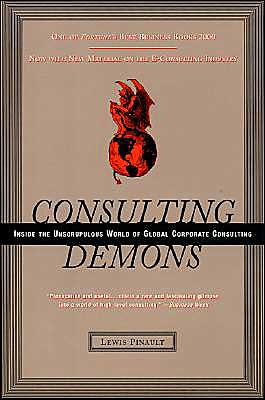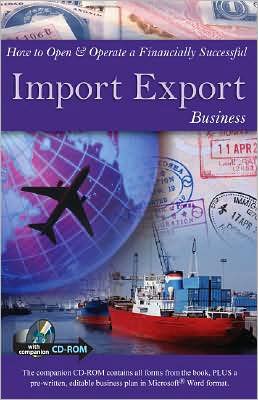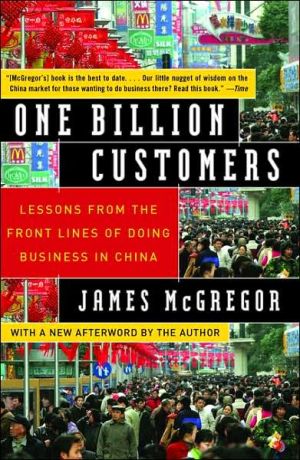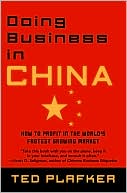Consulting Demons: Inside the Unscrupulous World of Global Corporate Consulting
In this gripping and colorful account of the American dream gone astray, Lewis Pinault provides the essential guidelines on how to get ahead and an enlightening perspective on the brutal infighting that can engulf even the most civilized consulting firm. This stunning exposé of some of the most prestigious and respected names in the business leads you into a world where a client's interests are skillfully subordinated to those of the consultants, where money rules the day, and where...
Search in google:
"What is a Management Consultant?" the prized MBA candidate asked. "The best of us--and that could be you--know without ever needing to ask. We're a Breed Apart," the consultant observed, arrogance and irony in perfect balance. "Okay, so that could be me, but what does that mean?" the MBA persisted. "Of course there's money involved," the consultant offered. "Great deals of money. World travel, first-class living. A chance to influence every corporation on the planet. Virtually no limits to whatever secrets and appetites you feel you need to indulge." "Yes, but what is it that we do?" the recruit tried one last time, his doubts rapidly evaporating. "You'll see. In this gripping and colorful account of the American dream gone astray, Lewis Pinault takes us to the shiny heights scaled, and the darkest depths sunk to, by those ill-defined creatures known as "Management Consultants." At once a riveting narrative, an alarming cautionary tale, and a treasury of useful advice, Consulting Demons is a rare insider's view of the lucrative arena of global management consulting. In this stunning expose of some of the most prestigious and respected names in the business, Pinault takes his readers by the hand and leads them into a world where a client's interests are skillfully subordinated to those of the consultants, where money rules the day, and where principles and morals are but unwelcome baggage. For aspiring consultants, this is an unvarnished look at the life of a consultant, with essential, darkly revealing guidelines on how to get ahead and an enlightening perspective on the brutal infighting that can engulf even the most civilized consulting firm. For current executives and potential clients, Pinault reveals what consultants are really thinking and scheming, and explores the unscrupulous lengths to which a consulting firm will go in order to protect and increase its own lucrative fees. For the general reader, this is a rollicking yarn brimming with vignettes drawn from a consultant's daily work, including such characteristic consulting activities as "benchmarking" (deep-cover corporate espionage), "business transformation" (mass brainwashing), and "client entertainment" (global debauchery). In this unique firsthand account, Pinault takes readers behind the scenes of the dehumanizing indoctrination of an academic intellectual into an exploitative--and exploited--"global transformation contractor." This incisive and telling book details his ascension in the business, the compromises he made to his integrity, and his eventual escape from a world he could no longer come to terms with.With true accounts of harrowing days spent in the hallowed trenches of consulting, and nights pondering personal relationships gone out of control, Consulting Demons offers the most complete look at an industry that exacts the highest prices for the most questionable standards of success. About the Author:Lewis Pinault spent more than a decade rising through the ranks of management con-sulting's most esteemed players, including the Boston Consulting Group in the U.S. and Japan, Gemini Consulting throughout Europe and Asia, and Coopers & Lybrand, where he became a Financial Institutions partner in Hong Kong, before leaving it all behind to pursue his first passion--International Space Law and Planetary Geosciences--at the University of Hawaii where he now works with both NASA and the UN Office of Outer Space Affairs. Busines Reader Review An entertaining look at global consulting. The story-based approach is supplemented by a surprisingly useful advice section at the end of each chapter.
Consulting and Me\ Like many of the industry's top achievers, I did not set out to become a management consultant, or even consider a business career, until well after college. Consulting recruiters value diversity and esoterica, founded on strong educational pedigrees, knowing that this is the stuff of staying a step ahead of one's clients, of engaging, entertaining, and when need be, duping them into a paying belief in new and unique perspectives.\ Diversity and esoterica I had in spades. I grew up in Rhode Island in the boom years of the 1960's, when everything interesting seemed to be happening all at once, but somewhere else. The youngest of six children, I benefited from parents with a staunchly liberal, New Deal view of the world and social justice, and brothers and sisters engaged in every part of the causes of the time. Several of them would embark on academic careers, and all would at least try to live out of state if not overseas. Though working-class poor, my parents encouraged the gathering of new experiences and a high investment in education.\ While most were caught up in one way or another with Vietnam, however, I developed an early and obsessive interest in the space program. More than anything else, I wanted to be a scientist astronaut, or perhaps an astrophysicist, and explore other worlds and solar systems. The moon landings seemed but a small first achievement, and between Arthur C. Clarke's 2001 and Star Trek, I had all the fuel I needed to imagine humanity's future role in space. A little weirdly, but telling for my interests in international space development then and today, my personal hero of 2001 was space-bureaucrat Heywood Floyd, not the odyssey-making astronauts, and the concept of Star Trek's United Federation of Planets intrigued me as much as any alien slug-fest featuring Captain Kirk. I was fortunate to have my choice of colleges, and the Massachusetts Institute of Technology I hoped would in turn give me a choice of jobs in the space program. But the late 1970's proved a dismal time for space development. Much of NASA's energy and budget was then consumed by trying to get the intractable space shuttle off the ground, and I was angered to find American popular, governmental, and commercial interest in space at an all-time low. Midway through MIT I chose two new directions which I hoped would one day lead me to an engaging career in the use and exploration of space. I started an ocean engineering major and internship program and enrolled in a domestic year-away program at the University of Chicago, to take up intensive Japanese studies.\ In ocean engineering I hoped to find the excitement and experience of exploration-driven technology development, something I planned to use when prospects for space development turned around. I loved the oceans, and inspired in part by Arthur C. Clarke's own celebration of both the oceans and outer space, I took up scuba diving and fully embraced my new medium. In Japan, I expected to learn something about large-scale project finance for civil engineering projects and hoped to tap that country's competitive strengths for application to space development, once the treaty law barring Japan's own space launches expired.\ These were towering ambitions for a poor, struggling student, but I had blundered into the right time and place for combining engineering and Japanese skills. Harvard's Ezra Vogel, with Japan As No. 1, had just hit the best-seller lists, and study of Japanese management techniques would soon become an institutionalized fad. After Chicago I returned for two more years at MIT and cross-registered at Harvard in Japanese language, business, and government, finally finishing inpolitical Science at MIT so that I could combine credits in both disciplines and still manage to graduate, in 1982. I had managed to squeeze in some fledging German into my poly sci degree, and while waiting on job applications, I took up a United Nations scholarship to do a summer internship in technology transfer at the UN complex in Vienna, Austria. Days before I left for Europe, I was offered and immediately accepted an open-ended job with the Japanese steelmaker and shipbuilder Nippon Kokan, where I would become one of the conglomerate's first foreign professional hires. I arranged to fly directly from Vienna to begin work at NKK's shipyards in Kawasaki at the end of the summer. My three years with Nippon Kokan were a key formative experience for me both personally and professionally, molding much of what would drive and sustain my later, largely unexpected commitment to consulting. Combining some of Japan's most challenging living conditions with exposure to one of the world's most stimulating urban cultures, all the while propelling me through extraordinary new responsibilities, in these years I became at once professionally confident and alive to Tokyo's many attractions, and desperately eager to find a means to enjoy them.\ Like many of the traditional Japanese industrial giants, Nippon Kokan firmly believed in isolating its new male employees in bachelor dormitories, where conditions were spartan at best. The idea was to build a certain sense of equality and camaraderie, reduce any last pretensions to a private life, and encourage early marriage to company-approved spouses.\ By and large this approach worked quite well. The pre-World War II Itanaka-ryo where I was assigned was infamous for dilapidated facilities, complete lack of heat or air conditioning through freezing winters and stultifying summers, and truly horrible food. We had one six-man o-furo bath for two hundred grimy shipyard workers, filled with hot water only every other day. I quickly learned to tolerate the blistering heat of a fresh fill of the bath, to avoid dealing with the floating scum that would quickly collect with the first few uses.
AcknowledgmentsxiAuthor's NotexiiiPreface to the Paperback EditionxvProloguexxiiiIntroduction: About Consulting Demons11.Consulting and Me72.The Recruiting Machine193.Consulting Spycraft314.The Client-Consultant Matrix615.The Hierarchy of Fear836.Big-Time Consulting1017.Business Prop Wash1198.The Clock-Face Sales Interview1439.Deferred Living17110.The Great Centurion19911.The Professions at Bay21912.Zirconium Proposals23313.Colonizing Consulting249Epilogue: Heros for the Zeros275Afterword to the Paperback Edition279Index283
\ Busines Reader ReviewAn entertaining look at global consulting. The story-based approach is supplemented by a surprisingly useful advice section at the end of each chapter.\ \ \ \ \ From The CriticsReading Lewis Pinault's new book is like driving by a car accident. You feel as if you shouldn't look - but you can't help yourself. The author seems so sleazy and self-absorbed, his professional wares so utterly worthless that you can't believe companies actually hire him. The book makes a compelling argument for newly minted MBAs to steer clear of consulting firms, and for managers who employ them to have their heads examined.\ Consulting Demons is full of tales of Machiavellian consultants who plot to rise through the consulting hierarchy by scaring clients into parting with millions of dollars in consulting fees. For example, Pinault explores the inner world of C.K. Prahalad, a consulting guru from the University of Michigan who popularized such management bromides as Strategic Intent and Core Competencies. Prahalad mesmerized Philips Electronics into spending millions on consultants who alternately humiliated and rebuilt the company's managers.\ In a manner reminiscent of George Stephanopoulos' All Too Human, Pinault also skewers his former mentors. He recounts the advice his old boss at the MAC Group gave him, detailing how best to carry on extramarital affairs in various cities while preserving the illusion of domestic harmony. It's all ostensibly in the name of expiation, and it seems of little consequence to Pinault whether his book lands with a thud upon the reputations of his ex-employers and ex-clients.\ A high divorce rate is one side effect of the amoral and self-absorbed behavior demonstrated by the mutant strain of humanity that Pinault portrays. A side effect of his book may be to frighten away those few MBAs who might still be considering a career in the consulting field.\ Could it be the coup de grace? Already consulting firms are having trouble recruiting the best and brightest. The talent goes where it can make the most money most quickly, so naturally the top B-school graduates are flocking to Internet startups and venture capital firms.\ Of course, sufficient grist for exposes on those industries probably exists right now. But it is unlikely that anyone in the middle of our shiny new-millennium money machines will toss a wrench in the works until the new new thing comes along. In the meantime, Consulting Demons will have to serve as a warning for those who find that McKinsey or Boston Consulting Group is the best they can do.\ As for companies that hire them, well, at least they're getting something for their money. Pinault suggests corporate espionage is one useful function that consultants perform for their clients. Such spying is a far cry from the honorable derring-do of James Bond and is instead conducted in a fashion that's at best morally ambiguous.\ The clever manager will read Pinault's accounts of consultants' tricks and remember them the next time he finds himself on the wrong end of a phone call from a consultant performing a "multiclient study." Or perhaps we should say "right" end, for the continued existence of such studies does not reflect well on those managers who hire consultants to conduct them.\ In fact, if you're considering a career in consulting or are a manager who works with consultants, Consulting Demons is one car wreck you should force yourself to look at.\ \ \








